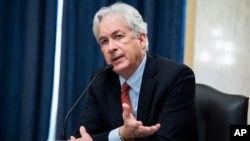The United States must train its spies and intelligence analysts on the rising threat from China, U.S. President Joe Biden’s pick to lead the country’s premier spy agency told lawmakers Wednesday, calling competition from Beijing “the biggest geopolitical test that we face.”
Former Ambassador William Burns, a career diplomat who served in Russia and the Middle East, shared the blunt assessment with members of the Senate Intelligence Committee during his confirmation hearing to lead the Central Intelligence Agency (CIA), further warning that this new era of great power competition with Beijing may be like no other in U.S. history.
“Competing China will be key to our national security in the decades ahead," Burns said, describing China’s leadership as both adversarial and predatory.
"The evolution of [President] Xi Jinping's China over the last six or seven years has been a very sharp wake-up call,” he added. "It's the kind of aggressive, undisguised ambition and assertiveness that I think has made very clear the nature of the adversary and rival that we face."
If confirmed, the 64-year-old Burns would become the first career diplomat to lead the CIA. He told lawmakers that his experience with working with the intelligence agency while at the State Department taught him the value of what its officers and analysts do.
“Good intelligence delivered with honesty and integrity is the critical foundation for sound policy choices,” he said, addressing concerns that under former President Donald Trump, some intelligence was politicized to support his administration’s political goals.
"Politics must stop where intelligence work begins," Burns said, promising a return to the credo of “speaking truth to power.”
Biden “said he wants the agency to give it to him straight, and I pledged to do just that, and to defend those who do the same," Burns added.
In between questions, lawmakers from both parties heaped praise on Burns, prompting Democratic Senator Ron Wyden from Oregon to comment the hearing was in danger of turning into a “full-fledged bouquet tossing contest.”
But there were questions about Burns’ time as president of the Carnegie Endowment for International Peace, a Washington-based think tank that participated in the China-United States Exchange Foundation and had ties to Tsinghua University in Beijing.
Burns said he inherited the relationship with the exchange program when he became president of Carnegie and that he quickly ended it because of concerns about Chinese influence, while at the same time seeking to make sure that Carnegie’s ties to Tsinghua University did not prevent the think-tank from doing independent work.
The Senate Intelligence Committee chairman, Democrat Mark Warner, and vice chair, Republican Marco Rubio, also pressed Burns on how he would handle what has become known as “Havana Syndrome” – a series of symptoms ranging from dizziness to headaches and hearing loss that has plagued diplomatic staff and intelligence officials in Cuba, Russia, China, and elsewhere.
“I will make it an extraordinarily high priority to get to the bottom of who's responsible … and to ensure that colleagues and their families get the care they deserve," Burns said.
Tackling Russian, Iranian threats
In addition to China, Burns laid out a series of other threats with which the U.S spy agency will have to grapple, including newer hazards like climate change and health security.
He also outlined threats to the U.S. digital supply chain, calling Russia’s hack of Texas-based software company SolarWinds, “a very harsh wake-up call, I think, for all of us about the vulnerability of supply chains and critical infrastructure."
Additionally, Burns warned against underestimating Russia.
"While Russia may be in many ways a declining power, it can be at least as disruptive, under [Vladimir] Putin's leadership, as rising powers like China,” he told lawmakers.
“As long as Vladimir Putin is the leader of Russia, we're going to be operating in a pretty narrow band of possibilities, from the very sharply competitive to the very nastily adversarial,” the former U.S. ambassador said.
On Iran, Burns said that the U.S. cannot trust the leadership in Tehran with a nuclear weapon.
"It's absolutely important for the United States to do everything we can to prevent Iran from developing a nuclear weapon," he told lawmakers.
Even if Iran returns to full compliance under the nuclear deal, known as the Joint Comprehensive Plan of Action (JCPOA), Burns said the deal must serve as a “platform” for building stronger constraints on Tehran’s nuclear program and on other malign activities.
Developing tech and cyber capabilities
Former officials warn Burns will face a number of other challenges, as well, should he be confirmed.
“I firmly believe that whoever best masters technology wins the global intelligence war,” Larry Pfeiffer, a former CIA chief of staff, told VOA.
“CIA needs to continue and reinforce its embrace of digital innovation to enhance collection, analysis, and dissemination of intelligence,” he said, noting the agency may have to make such changes with a stagnant or shrinking budget.
In his testimony, Burns said the spy agency will “have to work even harder” to develop technological and cyber capabilities, both to better attribute attacks and to enhance U.S. deterrence.
One issue that did not come up during Wednesday’s hearing, but which is likely to present a challenge for the CIA, is domestic extremism. Unlike the FBI, the CIA is prohibited from gathering information from those in the United States.
“Domestic extremism per se is a matter not for the CIA … but foreign connections and parallels to such extremism are within the agency's responsibility,” said Paul Pillar, a former senior CIA officer now with Georgetown University.
“The sensitivities related to how the problem is tied to American politics and parties may bleed over into the CIA's necessary coverage of the foreign dimensions," he said.
During her confirmation hearing last month, Director of National Intelligence Avril Haines told lawmakers that Russia, in particular, was pushing both on far left and far right groups in the U.S. “to promote extremism.”






